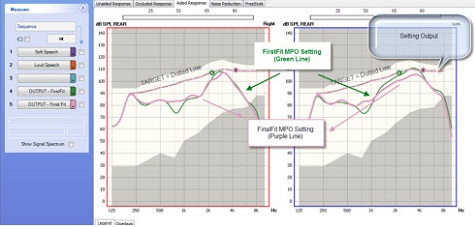Question
Loudness discomfort is not generally a problem for my patients using open fit hearing aids, as many of these aids have lower gain and output, however, every once in a while I have a complaint of loudness. How do I verify MPO with an open fitting?
Answer
Research tells us that setting the MPO wrong - either too high or too low - may have negative consequences and can even cause patients to reject their hearing aids. Therefore it's important to always verify MPO across the frequency range with probe microphone measurements, even with open fittings.
Follow these steps:
- Inspect the ear canal with your otoscope. Ensure it is clear, and take note of the geography in order to place the probe tube in the proper position.
- Be sure to inform the patient that you will be using a signal that is louder than they may prefer, in order to check the 'ceiling' of their hearing aid. Explain that the loudness of the signal is representative of a level that they may encounter in everyday use with their hearing aid.
Place the hearing aid in the OFF or MUTE setting, and tell the patient that they will first hear the signal with the hearing aids off, so that they have a reference for the unaided condition.
- Run a sweep tone MPO signal at 85 dB SPL. Ask the patient his or her perception of the loudness of the signal. The patient will typically describe the signal as loud, which provides you with an opportunity to counsel the patient and family members about loudness.
While it is not necessary to store the tracing as it will only be used for comparison purposes, you may want to visually check the response in the high frequency region.
- Turn the hearing aid ON (or unmute) and present the same 85 dB SPL sweep tone signal again.
- Compare the measured output response to the output target.

Figure reprinted with permission of Hearing Review. Click Here to View Larger View of Figure (PDF)
The output target will be calculated by the fitting formula, based the patient's individual LDLs if entered in the software, or on averages if no LDLs are entered. Ask the patient to compare the loudness of the signal in both conditions, hearing aid OFF v. ON.
- Adjust the hearing aid output as needed, using the manufacturer's fitting software.
The measurements shown here were made using the Otometrics AURICAL Modular Fitting System. I hope this information is helpful to you! Thanks for your question.
For more information on verification of open fittings, please refer to the Hearing Review article Three Probe Microphone Measurement Techniques to Enhance Open Fittings that covers this topic in more detail.
Wendy Switalski, AuD, is president of Audiometric Consultants Inc, in Waterford, Michigan, an audiometric equipment distributorship serving Michigan and Northern Ohio. She is also the owner of Alliance Hearing Care, an audiology clinic in the metro-Detroit area, and a consultant for Otometrics, specializing in the development and implementation of fitting systems.
For more information about Otometrics, visit www.otometrics.com, or the GN Otometrics web channel on AudiologyOnline.
